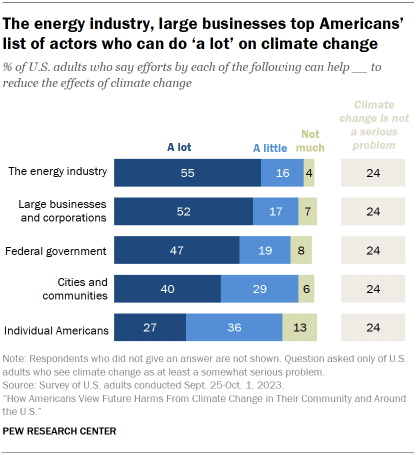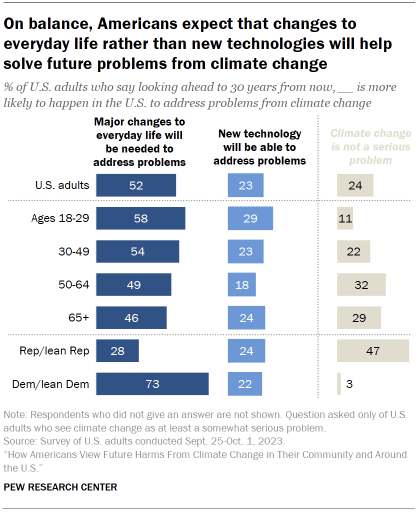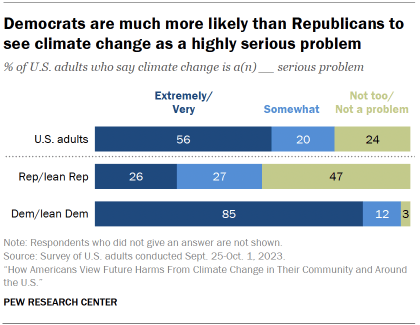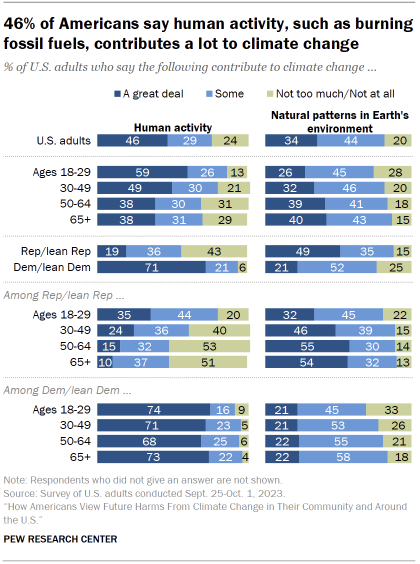Americans think the energy industry and large businesses can help the most to reduce the effects of climate change. The public sees individual Americans as having less ability to make an impact.
A majority of U.S. adults (55%) say efforts by the energy industry can help a lot to reduce the effects of climate change. A slightly smaller share (52%) say large businesses and corporations can help a lot to address climate change.

When it comes to the federal government, 47% think it can help a lot to reduce the effects of climate change; 40% say this about cities and communities.
Of the five groups asked about in the survey, the public ranks individual Americans as the least impactful on climate change. About a quarter of U.S. adults (27%) say efforts by individual Americans can help a lot to reduce the effects of climate change.
Nonetheless, majorities believe each of the groups asked about in the survey – including individual Americans – can do at least a little to reduce the effects of climate change. Few say there’s not much difference these groups can make on climate change.
These questions were asked only of the roughly three-quarters of Americans who say climate change is an extremely, very or somewhat serious problem. Those who said climate change is not too serious or not a problem were not asked these questions; this group makes up 24% of U.S. adults.
Views on climate adaptation and mitigation
Asked to look ahead to 30 years from now, far more Americans think major changes to everyday life will be needed to address the problems from climate change than believe new technology will be able to address most problems stemming from climate impacts.

About half of Americans (52%) think major changes to everyday life will be needed to address climate problems. Fewer than half as many (23%) say new technology will be able to address most problems from climate change.
The remaining share of the public (24%) thinks climate change is not a problem. Only those who say climate change is at least a somewhat serious problem were asked this question.
Most Democrats (73%) think major changes to everyday life will be needed to address problems from climate change, while a much smaller share (22%) think new technology will be able to address most problems.
Of the 53% of Republicans who think climate change is at least a somewhat serious problem, views are more evenly divided between saying changes to everyday life will be needed (28%) and new technology will solve most problems from climate change (24%).
Partisan differences in shares who say climate change is a highly serious problem
Overall, 56% of Americans say climate change is an extremely or very serious problem. Another 20% say it is a somewhat serious problem. About a quarter of Americans (24%) describe climate change as not too serious of a problem or not a problem at all.

A vast majority of Democrats (85%) say climate change is an extremely or very serious problem. By contrast, 47% of Republicans view climate change as not too serious or not a problem at all. About a quarter of Republicans say climate change is an extremely or a very serious problem; 27% say it is a somewhat serious problem.
Among the GOP, moderate and liberal Republicans are much more likely than conservative ones to describe climate change as an extremely or very serious problem (42% vs. 17%). A majority of conservative Republicans (58%) think climate change is not too serious or not a problem.
Views on human activity as a contributor to climate change

Overall, 46% of Americans think human activity contributes a great deal to climate change. About three-in-ten (29%) say human activity, such as the burning of fossil fuels, contributes some to climate change. Another 24% say it contributes not too much or not at all.
The share of Americans who say human activity contributes a great deal to climate change is unchanged since last year and slightly lower than in 2019, the first time the Center asked this question.
The survey also asked Americans how much they think natural patterns in the Earth’s environment contribute to climate change. About one-third (34%) say natural patterns contribute a great deal, while 44% say they contribute some and 20% say they contribute not too much or not at all. The share of Americans who say natural patterns contribute a great deal to climate change is virtually identical to in 2019.
Partisan affiliation and climate change beliefs
Most Democrats (71%) think human activity contributes a great deal to climate change. By contrast, just 19% of Republicans hold this view. A larger share of Republicans say human activity contributes not much or not at all to climate change (43%).
Republicans are more than twice as likely as Democrats to think natural patterns in the Earth’s environment contribute a great deal to climate change (49% vs. 21%).
Age and climate change beliefs
Younger Americans are more likely than their older counterparts to say human activity contributes a great deal to climate change. Among those ages 18 to 29, about six-in-ten (59%) think human activity contributes a great deal, compared with 38% those 65 and older.
Age differences are more pronounced among Republicans than Democrats. Among Republicans, those ages 18 to 29 are 25 points more likely than those ages 65 and older to say human activity contributes a great deal to climate change (35% vs. 10%). By comparison, similar majorities of both younger and older Democrats say human activity contributes a great deal to climate change.




